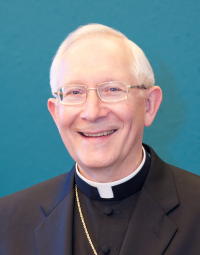
Archbishop Leonard P. Blair
As we move into 2021, I’m reminded of the beautiful prayer at the blessing of the paschal candle every Easter: “Christ yesterday and today, the beginning and the end, the alpha and the omega. All time belongs to him and all the ages. To him be glory and power through every age and forever. Amen.”
I take great encouragement from these words, and I hope you do too, as we continue to face the challenges of COVID-19, the tensions in the world today and amid the temptation many people feel to turn away from religious faith and practice.A recent study reports a growing decline in religion worldwide, most dramatically in the United States. From 1981 to 2007, our country ranked as one of the world’s most religious. Since then, though, it has shown the largest move away from religion of any country for which the study had data. (CARA Report, Fall 2020)
For more and more people, religion is relegated to the private sphere, and is increasingly being blamed for oppression and the world’s conflicts. Religion no longer has a decisive influence on our culture, the arts and sciences, public life and on moral and ethical issues. A common understanding of good and evil, justice and injustice, right and wrong, is eroding. Today, even the life of unborn babies is no longer protected, and something as fundamental as marriage is no longer believed to have any God-given meaning and purpose, but can be redefined by us at will.
An article in U S A To d a y once reported on the growing number of Americans who “simply shrug off God, religion, heaven or the ever-trendy search-for-meaning and/or purpose. Their attitude could be summed up as ‘So what?’” Consider the example of a young Chicago adult identified as Catholic: “The more [he] read evolutionary psychology and neuropsychology, the more it seemed to him, ‘We might as well be cars. That, to me, makes more sense than believing what you can’t see.’”
Without faith in what is unseen, the comparison of the human person to a car is not surprising. The Second Vatican Council taught that “once God is lost sight of, the human person is lost sight of too.” Where doubt over God becomes prevalent, then doubt over humanity follows inevitably. We see today how widely this doubt is spreading. We see it in the joylessness, in the inner sadness that can be read on so many human faces today, in the emptiness and aimlessness that leads to addictions and suicides. Religion gives me the conviction that it is good that I exist, that it is good to be a human being, even in hard times.
When the Second Vatican Council met in the 1960s, the Council Fathers taught that concern about the world to come should not diminish our concern for this world. Now more than a half-century later, we almost have to turn that statement around. Concern for this world should not diminish our concern for the world to come. People today need to hear a convincing and uplifting message about the ultimate purpose of their lives. They also need to recognize that implanted within them is a deep thirst for God.“Faith,” Pope Benedict once said, “makes a person happy from deep within,” because we know that God’s love for us will never cease and neither will we. Because his love embraces us here below, we live in confident hope of eternal life. True freedom is not the human ability to do whatever we want, but rather the divine grace to love and overcome the shackles of our human weakness and sin so that we can do what is right and good.
Needless to say, our Catholic faith is not about professing beliefs in church on Sunday and then during the week being a party to unjust laws, social or racial prejudices, corrupt practices, ignoring or exploiting the poor and the marginalized or promoting sexual behavior contrary to Catholic moral teaching, including the right to life of every human being from conception to natural death.
As believers, our mission is to be loving and courageous witnesses to the truth about God, about Jesus, about the reality of sin and the need for repentance and faith. In the words of Pope Francis, “we cannot passively and calmly wait in our church buildings,” but wherever we find darkness we must bring the unquenchable light of Christ. Let this be our resolution in 2021!
